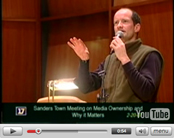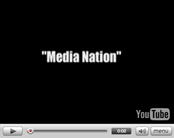Hijacking Catastrophe Review
Neo-Conned! –
Hijacking Catastrophe: 9/11, Fear, And The Selling of American Empire
Written by Rob Williams (robw@acmecoalition.org)
What’s the most important dilemma U.S. citizens confront as we enter the 2004 presidential election season? Here’s a short list of possibles. Some say poverty: the Census Bureau tells us that almost 40 million Americans live at or below the poverty line. Others say the ailing health care system: more than 45 million Americans are now uninsured, and the cost of health insurance is rising by 15-20% per year. The U.S. deficit? Now at $375 billion and growing, the highest it has ever been, according to the U.S. Commerce Department. The U.S. debt, meanwhile, is ballooning to a projected record-breaking level of $7 trillion. Or what about quality jobs? The U.S. unemployment rate hovers around 5.6 percent, while median household income remains stagnant at $43,000.
All of these dilemmas are critical to debates about this country’s prospects, but one issue looms larger than all others: the future direction of U.S. Empire. We are citizens of the richest and most powerful empire in world history. As countless poets and pundits have pointed out, the 9/11 tragedy three years ago proved a "wake up call" for many Americans. Now, three years later, it is critical that we make our imperial foreign policy the subject of intense scrutiny during the presidential debates leading up to the election.
And there is no better film to serve as a springboard than the Media Education Foundation’s new hour-long documentary "Hijacking Catastrophe." Produced by MEF Executive Director Sut Jhally and Jeremy Earp, narrated by veteran activist Julian Bond, and featuring more than two dozen interviews, "Hijacking" argues that a small but influential group of fringe Republican ideologues – Paul Wolfowitz, Dick Cheney, Donald Rumsfeld and "National Review" editor William Kristol among them – have leveraged the national trauma of the 9/11 terror attacks to revamp U.S. foreign policy based on a pre-existing neoconservative blueprint, while simultaneously rolling back social programs and civil liberties here at home.
Other filmmakers have gone down this road, most notably "Fahrenheit 9/11’s Michael Moore. His film suffers from a number of flaws, however, including a frustrating focus on Bush-bashing to the exclusion of any larger sustained structural argument about the nature, direction, and key players involved in shaping post-9/11 U.S. foreign policy. Not so with "Hijacking Catastrophe." Jhally and Earp wisely keep their unwavering gaze focused on the decades-long ideological debates that have played out within elite foreign policy circles underneath the corporately-owned U.S. news media’s radar, debates that culminated in the immediate aftermath of the 9/11 attacks, when neoconservatives moved quickly to solidify their strategic plans for unilateral U.S. global dominance.
And if you are tempted to think that all of this has little to do with the mundane realities of existence, think again. "Hijacking Catastrophe" also lays bare the opportunity costs inherent in the neocons’ plans. The invasion and occupation of Iraq has cost U.S. taxpayers close to $150 billion dollars. (That’s you and me –more than half of U.S.–based corporations simply don’t pay taxes any more). These financial resources could be used to address all of the pressing problems – education, health care, job re-training – that so many Americans are concerned about, not to mention strengthening the chronically under-funded Department of Homeland Security or strengthening programs designed to find and stop ACTUAL terrorist networks who mean U.S. citizens harm. (Where are those pesky Iraqi WMDs or those proven links between Saddam and al Qaeda, anyway? More sobering, perhaps, is the cost in human lives. Close to 1,000 U.S. soldiers have been killed in Iraq, courageously fighting and dying in the Middle Eastern desert to support the D.C.-based neo-cons’ grand vision (almost all of whom avoided military service during Vietnam). 6,000 more U.S. soldiers have been injured, many losing arms, legs, or their eyesight in combat. Between 10,000 and 13,000 Iraqis have been killed – we don’t know exact numbers, because the Pentagon has refused to count the Iraqi dead.
Simply stated, "Hijacking Catastrophe" offers the most provocative exploration of post-9/11 U.S. foreign policy to date. It may be the most important documentary film of this presidential election season. Don’t miss it.
Dr. Rob Williams is board co-president of the Action Coalition for Media Education (
www.acmecoalition.org). Find out more about "Hijacking Catastrophe" at www.hijackingcatastrophe.org, including ACME’s FREE and downloadable "Hijacking" study guide for teachers.



![View your cart items []](/sites/default/modules/ecommerce/cart/images/cart_empty.png)




